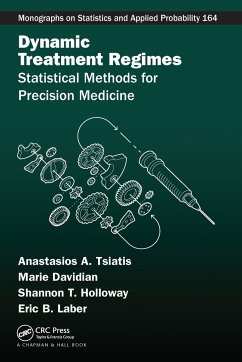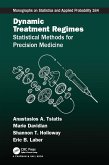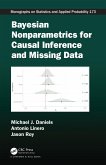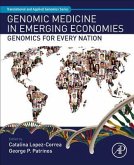Dynamic Treatment Regimes: Statistical Methods for Precision Medicine provides a comprehensive introduction to statistical methodology for the evaluation and discovery of dynamic treatment regimes from data. Researchers and graduate students in statistics, data science, and related quantitative disciplines with a background in probability and statistical inference and popular statistical modeling techniques will be prepared for further study of this rapidly evolving field.
A dynamic treatment regime is a set of sequential decision rules, each corresponding to a key decision point in a disease or disorder process, where each rule takes as input patient information and returns the treatment option he or she should receive. Thus, a treatment regime formalizes how a clinician synthesizes patient information and selects treatments in practice. Treatment regimes are of obvious relevance to precision medicine, which involves tailoring treatment selection to patient characteristics in an evidence-based way. Of critical importance to precision medicine is estimation of an optimal treatment regime, one that, if used to select treatments for the patient population, would lead to the most beneficial outcome on average. Key methods for estimation of an optimal treatment regime from data are motivated and described in detail. A dedicated companion website presents full accounts of application of the methods using a comprehensive R package developed by the authors.
The authors' website www.dtr-book.com includes updates, corrections, new papers, and links to useful websites.
A dynamic treatment regime is a set of sequential decision rules, each corresponding to a key decision point in a disease or disorder process, where each rule takes as input patient information and returns the treatment option he or she should receive. Thus, a treatment regime formalizes how a clinician synthesizes patient information and selects treatments in practice. Treatment regimes are of obvious relevance to precision medicine, which involves tailoring treatment selection to patient characteristics in an evidence-based way. Of critical importance to precision medicine is estimation of an optimal treatment regime, one that, if used to select treatments for the patient population, would lead to the most beneficial outcome on average. Key methods for estimation of an optimal treatment regime from data are motivated and described in detail. A dedicated companion website presents full accounts of application of the methods using a comprehensive R package developed by the authors.
The authors' website www.dtr-book.com includes updates, corrections, new papers, and links to useful websites.
"Biostatisticians, those that are professional as well as masters level and PhD level, will find this book useful. It is written by well-known experts who have incredible track records in this field, both methodologically and in designing and implementing/analyzing SMARTs and observational studies to uncover optimal dynamic treatment regimes. The text is rigorous in its statistical definitions and theorems. It is a comprehensive text on the area of dynamic treatment regimes and SMART design. Both those familiar with this area and those new to the area will learn something. They offer some interesting uses of the SMART design (e.g., dose finding and extending beyond 2 stages), that you cannot find in current manuscripts."
~Kelley Kidwell, University of Michigan
"The book will serve as an excellent reference and textbook. I expect I will use the book in my own class, once it is available. Besides being a comprehensive treatment of dynamic treatment regimes, the revision/re-introduction to causal inference, potential outcomes, M-estimators, propensity scores, and related issues is extremely useful."
~Daniel Lizotte, The University of Western Ontario
"Statisticians/biostatisticians directly involved in planning SMARTs would likely find this material useful, as they would have to adapt or extend these methods to particular trials being planned. Also, academic statisticians aiming to get into this field of methodological research would likely find the material as a useful summary of the already extensive literature; however, as the field is fast-moving, this material only serves as a starting point. The authors are not providing a cookbook-style guide to planning a variety of different kind of SMARTs, they provide examples, and enough theoretical background rigorously presented to get started in the area."
~Olli Saarela, University of Toronto
"(Chapters 2-4) are very nice indeed: well written, well structured, informative and interesting. Congratulations to the authors... I went to the website, which is beautiful. The authors have put lots of effort into this.
~Robin Henderson, Newcastle University
~Kelley Kidwell, University of Michigan
"The book will serve as an excellent reference and textbook. I expect I will use the book in my own class, once it is available. Besides being a comprehensive treatment of dynamic treatment regimes, the revision/re-introduction to causal inference, potential outcomes, M-estimators, propensity scores, and related issues is extremely useful."
~Daniel Lizotte, The University of Western Ontario
"Statisticians/biostatisticians directly involved in planning SMARTs would likely find this material useful, as they would have to adapt or extend these methods to particular trials being planned. Also, academic statisticians aiming to get into this field of methodological research would likely find the material as a useful summary of the already extensive literature; however, as the field is fast-moving, this material only serves as a starting point. The authors are not providing a cookbook-style guide to planning a variety of different kind of SMARTs, they provide examples, and enough theoretical background rigorously presented to get started in the area."
~Olli Saarela, University of Toronto
"(Chapters 2-4) are very nice indeed: well written, well structured, informative and interesting. Congratulations to the authors... I went to the website, which is beautiful. The authors have put lots of effort into this.
~Robin Henderson, Newcastle University








